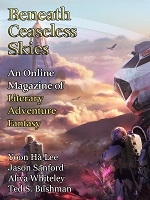 Beneath Ceaseless Skies #349, February 10, 2022
Beneath Ceaseless Skies #349, February 10, 2022
“Bonsai Starships” by Yoon Ha Lee
“Blood Grains Scream in Memories” by Jason Sanford
“Rich Growth” by Aliya Whiteley
“Burying the Seeds of Spider Gods” by Ted S. Bushman
Reviewed by Victoria Silverwolf
This double-sized issue, featuring stories of science fantasy, offers tales of technology that resembles magic. Common themes include strange plants, artificial beings, and attempts to restore damaged environments with unexpected consequences.
As its title implies, “Bonsai Starships” by Yoon Ha Lee deals with very unusual miniature trees that are grown to provide the propulsion for space-going vessels. The protagonist cares for three such plants, two of which are gentle and one that is aggressive. When representatives of the ruler of a star empire arrive, intending to take all the trees to power their warships, she comes up with a plan of her own to frustrate their scheme.
The premise is a poetic one, and the story is written in an elegant, engaging style. Sometimes the nature of the extremely weird bonsai plants is difficult to understand. This relatively brief tale has a simple, predictable plot, and is most enjoyable for the author’s writing skill and imagination.
“Blood Grains Scream in Memories” by Jason Sanford is the latest in a series of stories set long after nanomachines designed to protect the environment have taken control of humanity. Some people are nomads, while others contain the nanomachines in their bodies and act as enforcers for the devices, punishing those who harm the environment.
In this novella, a former enforcer travels with the nomads after rebelling against the machines. Her caravan is surrounded by a mist made up of the nanomachines, under the control of an enemy of the enforcer, intent on revenge. Their encounter reveals the true nature of the enemy, and leads to a battle with a seemingly indestructible army of mindless warriors.
This synopsis is greatly oversimplified and somewhat misleading, as the story has a very complex background and features many unusual characters. (One is made up entirely of a mass of rogue nanomachines, for example, that takes the form of a dead woman based on her recorded memories.)
The story creates an intriguing sense of mystery, because it involves the nanomachines acting in a new and unexpected way. The climactic conflict between the protagonist and her enemy creates a true sense of wonder. Readers unfamiliar with other stories in the series may find it difficult to follow some of the plot, which depends on events related in earlier tales.
In “Rich Growth” by Aliya Whiteley, some children are sold to farmers who use them to induce strange plants to grow to the top of a dome, where they collect valuable, gem-like flowers. Those workers who are not careful sometimes become permanently attached to the plants, dooming them to be consumed by them. The plot deals with the arrival of a boy who deliberately joins with a plant.
The premise is thought-provoking, if not entirely plausible. Even the characters wonder why this system exists, without receiving an answer. If some kind of allegory is intended, it is not at all clear.
The narrator of “Burying the Seeds of Spider Gods” by Ted S. Bushman is an artificial human being, created by robots in order to repair the damaged environment of the Earth by planting special seeds. At first, her unusual appearance leads to her execution for witchcraft. Years after her body is buried, she comes back to life, marries a man, and bears three children. The offspring play an important role in the robots’ plan.
The author creates an eerie and exotic mood, through the description of the bizarre, mysterious robots and the unusual narrator. Sometimes, she seems like a completely normal woman; other times, she is something very inhuman indeed. This inconsistency adds to the story’s interest, but strains credibility.
It is difficult to believe that a being who can resurrect herself from scattered, rotting body parts, and who is shown to have artificial structures within her body, could also be a very ordinary wife and mother. The manner in which her three children bring about the story’s apocalyptic conclusion is unclear, although it does make the important point that restoring a damaged environment may come only at a very high cost.
Victoria Silverwolf is currently reading several old issues of the magazine Short Story International, which sometimes published science fiction and fantasy.